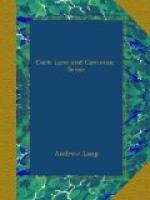Once more, if we admit the theory of intentional imposture by saints, angakut, Zulu medicine-men, mediums, and the rest, we must grant that a trick which takes in a professional conjurer, like Mr. Kellar, is a trick well worthy of examination. How did his Zulu learn the method of Home, of the Egyptian diviners, of St. Joseph of Cupertino? {78a} Each solution has its difficulties, while practical investigation is rarely possible. We have no Home with us, at present, and the opportunity of studying his effects carefully was neglected. It was equally desirable to study them whether he caused collective hallucinations, or whether his effects were merely those of ordinary, though skilful, conjuring. For Home, whatever his moral character may have been, was a remarkable survival of a class of men familiar to the mystic Iamblichus, to the savage races of the past and present, and (as far as his marvels went) to the biographers of the saints. ‘I am one of those,’ says the Zulu medicine-man, in Mr. Rider Haggard’s Allan’s Wife, ’who can make men see what they do not see.’ The class of persons who are said to have possessed this power appear, now and then, in all human history, and have at least bequeathed to us a puzzle in anthropology. This problem has recently been presented, in what may be called an acute form, by the publication of the ’Experiences of Mr. Stainton Moses’. {78b} Mr. Moses was a clergyman and schoolmaster; in both capacities he appears to have been industrious, conscientious, and honourable. He was not devoid of literature, and had contributed, it is said, to periodicals as remote from mysticism as Punch, and the Saturday Review. He was a sportsman, at least he was a disciple of our father, Izaak Walton. ’Most anglers are quiet men, and followers of peace, so simply wise as not to sell their consciences to buy riches, and with them vexation, and a fear to die,’ says Izaak.
In early middle age, about 1874, Mr. Moses began to read such books as Dale Owen’s, and to sit ‘attentive of his trembling’ table, by way of experiment. He soon found that tables bounded in his presence, untouched. Then he developed into a regular ‘medium’. Inanimate objects came to him through stone walls. Scent of all sorts, and, as in the case of St. Joseph of Cupertino, of an unknown sort, was scattered on people in his company. He floated in the air. He wrote ‘automatically’. Knocks resounded in his neighbourhood, in the open air. ‘Lights’ of all varieties hovered in his vicinity. He spoke ‘automatically,’ being the mouth-piece of a ‘spirit,’ and very dull were the spirit’s sermons. After a struggle he believed in ‘spirits,’ who twanged musical notes out in his presence. He became editor of a journal named Light; he joined the Psychical Society, but left it when the society pushed materialism so far as to demonstrate that certain professional mediums were convicted swindlers.
The evidence for his marvels is the testimony of a family, perfectly respectable, named Speer, and of a few other witnesses whom nobody can suspect of conscious inaccuracy. There remain, as documents, his books, his MS. notes, and other corroborative notes kept by his friend Dr. Speer, a sceptic, and other observers.




